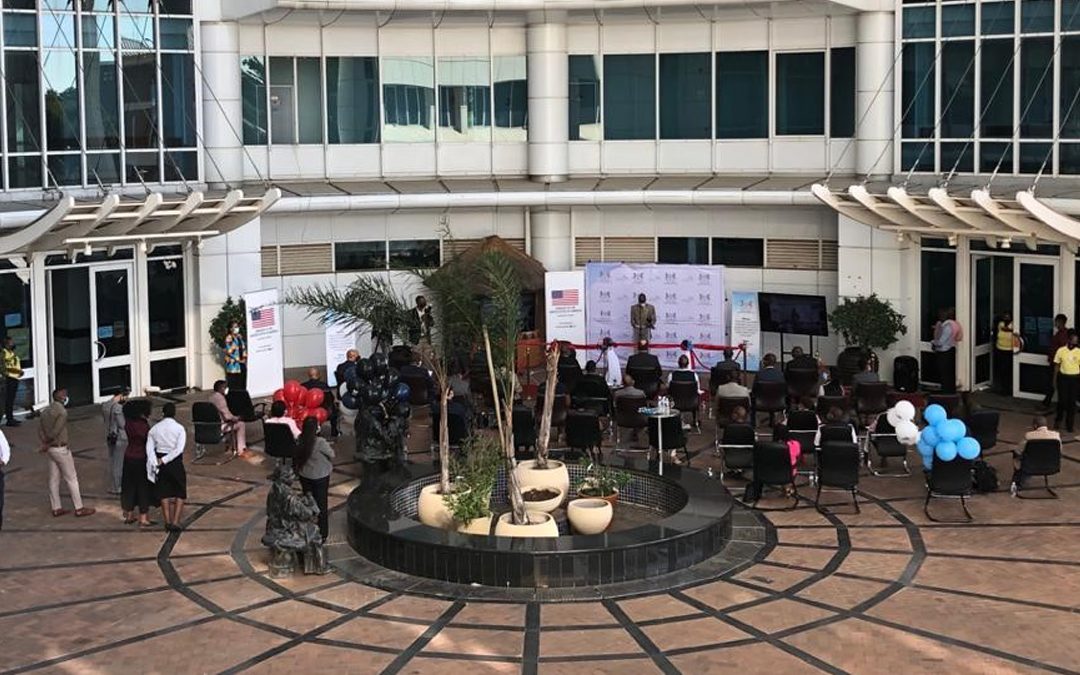The Embassy of the United States of America in partnership with Rutgers University, the University of Botswana, and Botswana’s Ministry of Health and Wellness has officially launched a $160,000 (BWP 1,750,000) grant that will create a clinical telehealth program in Botswana and further enhance existing medical and higher education partnerships between the two countries.
The grant is part of the U.S. Department of State’s University Partnerships Initiative, which seeks to strengthen existing ties and foster new collaborations between U.S. and African universities. This project supports the Government of Botswana’s pandemic mitigation efforts in remote and under-resourced communities across the country as well as establishes a framework to bolster health systems through telehealth and expanded educational opportunities.
The grant focuses on improving the quality, safety, effectiveness, and delivery of medical treatment, care, and prevention throughout Botswana. Initially, the program will focus on COVID-19. The improved telehealth capabilities will also help with the care and prevention of other infectious diseases, such as tuberculosis (TB) and HIV/AIDS, and help lay the groundwork for applying telehealth in the treatment of noncommunicable diseases such as cancer, diabetes, and heart disease.
A timely and crucial initiative
The telehealth partnership was publicly announced on April 13 during an outdoor ceremony held in the Ministry of Health and Wellness Courtyard in Gaborone, Botswana. Speaking on behalf of the Botswana-Rutgers Partnership for Health, program manager Refeletswe Lebelonyane thanked the U.S. Embassy for its support of a timely and crucial initiative.
“We recognize the vulnerabilities of the people of Botswana, who increasingly have chronic health conditions, in addition to some of the highest rates of tuberculosis and HIV infection in the world,” said Lebelonyane, who is also a senior research and education fellow for Rutgers Global Health Institute and an adjunct lecturer in the University of Botswana’s School of Medicine. “This pandemic has complicated patient care, disrupted academic learning, and halted economic growth. These realities of the current health crisis empowered us to think differently and seek new possibilities.”
Grant funding will be used to identify and address the needs for health information technology in Botswana. This includes:
- assessing the capacity of health care facilities, especially in remote settings, to build technology infrastructure (equipment, software, and bandwidth) and recruit personnel (technical experts, administrative, and managerial) in order to better facilitate distance learning, telementoring, and telemedicine initiatives at six Ministry of Health and Wellness sites across four cities;
- expanding commercial bandwidth through a trial across these six sites, helping to establish them as regional telehealth hubs; and
- designing a pilot telementoring initiative as an urgent training intervention for COVID-19 infection and disease management.
Five of the sites involved in the project are Ministry of Health and Wellness hospitals that also serve as teaching hospitals for the University of Botswana: Letsholathebe Memorial Hospital in Maun; Nyangabgwe Referral Hospital in Francistown; Sekgoma Memorial Hospital in Serowe; and Princess Marina Hospital and Sir Ketumile Masire Teaching Hospital in Gaborone. The sixth site is at the Ministry of Health and Wellness headquarters in Gaborone.
Laying the groundwork for future advancements
The project will inform smart deployment of resources and dedicated personnel to help integrate technology solutions in Botswana’s remote settings. It will also create a framework to facilitate the development of virtual telementoring and distance learning initiatives; telehealth initiatives that provide case consultations and virtual patient visits in all health districts; and a virtual platform to forecast, prevent, and control epidemics (COVID-19, H1N1, and SARS), infectious diseases (HIV/AIDS, TB), and noncommunicable diseases (cancer, diabetes, heart disease). This includes disease surveillance, infectious disease modeling, pathogen discovery, contact tracing, and public health awareness programs.
“Botswana has chosen well in partnering with Rutgers University,” said Acting Deputy Chief of Mission David Krzywda, who delivered remarks on behalf of U.S. Ambassador Craig Cloud. “Rutgers is one of the leading public universities in the United States and has a special relationship with Botswana through its global health program. Rutgers is an academic and research institution that is a leader in so many fields that can greatly contribute to Botswana’s success.”
Minister of Health and Wellness Edwin G. Dikoloti spoke about how this project is mobilizing Botswana to seek solutions with long-term implications in many areas. Acknowledging the many unanticipated disruptions the COVID-19 pandemic has caused, he said, “We could have viewed it as a setback, but instead, this funding and the partnership it created have empowered us to reimagine health, health care, the public health, and academic learning. This new way of thinking will help us immensely, not only in surviving the pandemic, but in thriving as we look ahead.”
Watch the full ceremony on the Ministry of Health and Wellness Facebook page:

